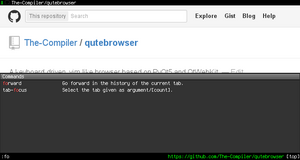Software:qutebrowser
 | |
 qutebrowser running in the command mode. | |
| Original author(s) | Florian Bruhin ("the Compiler") |
|---|---|
| Developer(s) | |
| Initial release | December 14, 2014[4] |
| Stable release | 2.3.0 (28 June 2021[5]) [±] |
| Written in | Python, JavaScript |
| Engine | WebKit or QtWebEngine |
| Operating system | Linux, Windows, macOS, FreeBSD, OpenBSD[6] |
| Available in | 1[7] languages |
List of languages English[7] | |
| Type | Web browser |
| License | GPL-3.0-or-later |
qutebrowser (pronounced "cute browser" /kjuːtbraʊzər/ [citation needed]) is a QtWebEngine web browser for Linux, Windows, and macOS operating systems with Vim-style key bindings and a minimal GUI.[8] It is keyboard-driven and is inspired by similar software such as Vimperator and dwb.[9] It uses DuckDuckGo as the default search engine. qutebrowser is included in the native repositories of Linux distributions such as Fedora and Arch Linux.[10] qutebrowser is developed by Florian Bruhin, for which he received a CH Open Source award in 2016.[1]
Functionality
As in Vim and vi, the browser has a command mode and an insert mode. In command mode key bindings can be used to perform functions, for example: 'G' to go to the bottom of a page, and 'gg' to the top. Specific commands can also be bound to keys or key-sequences by the user. A cheat sheet of all key bindings can be found here and they can be trained here.
qutebrowser is both written in and configured in Python. Through the configuration file custom functionality can be added, including custom key bindings, per-site settings, and arbitrary Python code that can interact with your browser or your system.[11]
Since version 2.0.0, qutebrowser supports blocking ads using the python adblock library. For users that don't have the adblock library installed or use an older version of qutebrowser, a simpler built-in adblocker can be used and modified using the blocked-hosts file that comes with qutebrowser.[12]
Security
In July 2018, it was found that all versions of qutebrowser prior to 1.4.1 have a cross-site request forgery vulnerability that allowed websites to change qutebrowser settings and, via settings like editor.command, possibly execute arbitrary code.[13] This was fixed in version 1.4.1; backported patches are available for prior versions.[14]
See also
- QtWebEngine – the layout engine that the application uses by default, based on Chromium[15]
- WebKit – the layout engine that the application can optionally use instead of WebEngine
- List of web browsers
- uzbl – another minimalist web browser with similar concept
- Minimalism (computing)
References
- ↑ 1.0 1.1 "»CH Open Source Awards 2016« vergeben". Pro-Linux. http://www.pro-linux.de/news/1/24116/ch-open-source-awards-2016-vergeben.html.
- ↑ "Release qutebrowser v0.1 · qutebrowser/qutebrowser". https://github.com/qutebrowser/qutebrowser/releases/tag/v0.1.
- ↑ "Releases - qutebrowser/qutebrowser - GitHub". https://github.com/qutebrowser/qutebrowser/releases/.
- ↑ "Installing qutebrowser | qutebrowser". https://qutebrowser.org/doc/install.html.
- ↑ 7.0 7.1 "Internationalization #31". GitHub. https://github.com/qutebrowser/qutebrowser/issues/31.
- ↑ "Qutebrowser: браузер для поклонников vim" (in ru). PCWeek Russia. https://www.itweek.ru/foss/blog/foss/8694.php.
- ↑ "FAQ". https://qutebrowser.org/FAQ.html.
- ↑ "qutebrowser – ArchWiki". archlinux.org. https://wiki.archlinux.org/index.php/Qutebrowser.
- ↑ "Configuring Qutebrowser". https://qutebrowser.org/doc/help/configuring.html.
- ↑ "Frequently asked questions | qutebrowser". https://qutebrowser.org/doc/faq.html.
- ↑ "CVE-2018-10895". https://cve.mitre.org/cgi-bin/cvename.cgi?name=CVE-2018-10895.
- ↑ Bruhin, Florian (11 July 2018). "CVE-2018-10895: Remote code execution due to CSRF in qutebrowser". qutebrowser-announce (Mailing list). Archived from the original on 9 November 2020. Retrieved 26 May 2021.
- ↑ "Qt WebEngine Overview". Qt Project. https://doc.qt.io/qt-5/qtwebengine-overview.html.
External links
 |
